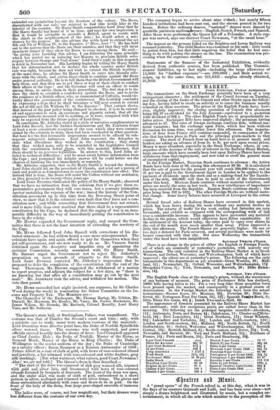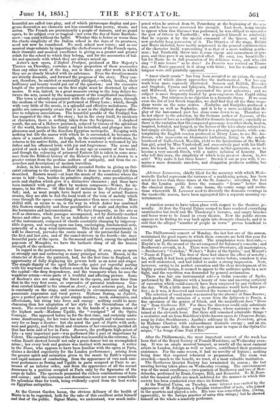C4tattro nu 311uoir.
A "grand opera" of the French school is, at this day, what it was in the days of its creators Quinault and Lulli, and has been ever since—not simply a drama heightened and illustrated by music, but a complex en- tertainment, in which all the arts which minister to the perception of the
beautiful are called into play, and of which picturesque display and gor- _ geous decoration are elements not less essential than poetry, music, and action. The French are preeminently a people of dancers, and no grand opera, be its subject ever so tragical—not even the day of Saint Bartholo- mew—can,exist without the ballet. Whether this is better or worse than the chaste simplicity of the Italian school in the days of its greatness, need not now be considered. No such school now exists ; and as our musical stage subsists by importing the chefs-d'oeuvre of the French opera, their dramatic and musical excellence is giving us a greater and greater relish for the school to which they-belong, and for the accessories of bal- let and spectacle with which they are always mixed up.
Auber's new opera, L' _Enfant Prodigue, produced at Her Majesty's Theatre on Thursday, contains a larger proportion of these accessories than any other work of the day, nor is there any other work in which they are so closely blended with its substance. Even the divertissements are strictly dramatic, and forward the progress of the story. They can- not, therefore, be omitted or materially abridged,—which, besides, their brilliancy and beauty would put out of the question ; and the excessive length of the performance on the first night must be shortened by other means. It was, indeed, in a great measure owing to the long delays be- tween the acts, caused by the management of the complicated machinery. The town is already acquainted with the subject of the piece, through the medium of the version of it performed at Drury Lane ; which, though with very little of the music, is a splendid and effective melodrama. The public are consequently aware that it is not in the slightest degree offen- sive to religious associations. The beautiful parable of the Prodigal Son Las suggested the idea of the story ; but in the story itself, its incidents or characters, there is nothing taken from the Scriptures. A shepherd youth, the son of a Hebrew patriarch, seduced by visions of the splendour of the world, forsakes his family and his betrothed, and plunges into the pleasures and perils of the dissolute Egyptian metropolis. Escaping with nothing but life the snares with which he is surrounded, he becomes the slave of a camel-driver. At length, in the extremity of destitution, ho returns to his native fields, and the forlorn wanderer is welcomed by his father and his affianced bride with joy and forgiveness. The scene and period of such a tale might be laid in any age or country of the world; and though the colouring of primaaval Eastern life is taken in some mea- sure from the Biblical history of the Hebrew tribes, yet it is drawn to a greater extent from the profane authors of antiquity, and from the re- searches and descriptions of modern travellers.
Auber, in his music, has admirably seconded Scribe in givina. an Ori- ental colouring to the subject. How this is done is more easily felt than described. Eastern music —at least the music of the countries where the scene is laid—has, besides its primitive simplicity, some peculiarities of scale and rhythm which give it a distinctive character ; and these have been imitated with great effect by modern composers—Weber, for in- stance, in his Oberon. Of this kind of imitation the Enfant Prodigue is lull ; and, as most people have heard more or less of actual Eastern strains, they are able to feel the local truth of the vein of melody which runs through the opera—something pleasanter than mere newness. More skilful still, as seems to us, is the way in which Auber has combined this Eastern simplicity and these peculiarities of scale and rhythm with his harmonies and instrumentation. We have frequently, in the airs as well as choruses, whole passages accompanied, not by distinctly-marked basses and other parts, but by an indefinite yet rich and delicious hum of the instruments, composed of chords constantly changing by impercep- tible degrees, and moving upon one long, unchanging, fundamental note, generally of a deep wind-instrument. This kind of accompaniment, it will be observed, pervades the rustic music of the patriarchal family in the first and last acts, and of the camel-drivers in the fourth—the most beautiful parts of the opera. In the second and third, among the splendid pageants of Memphis, we have the barbaric clang of all the brazen strength of the orchestra.
In regard to the performance, we have seldom, if ever, seen an opera so strongly cast and embracing so many principal artists. Massol, in the character of Reuben the patriarch, had, for the first time in England, an opportunity of fully displaying his powers both as an actor and singer. The simple dignity of the aged father—the quiet yet regretful parting with his wayward son—the forlorn search for him through the crowds of the capital—the deep despondency, and the transports when he sees the wanderer return—were parts of a truthful and affecting picture. Some of Reuben's airs are among the finest in the opera, and none finer than that in the very first scene, so expressive of parental tenderness. Gar- doni exerted himself to his utmost as Azael ; a most arduous part, for he is constantly on the stage, and constantly in circumstances calling for passionate expression and vocal power. Madame Sontag, as lephtele, gave a perfect picture of the quiet simple maiden ; meek, submissive, and affectionate, but rising into force and energy : nothing could be more charming than her adaptation of her style to the Orientalisms of the music. The second female part was in the hands of a prima donna of the highest mark—Madame 17galde, the " rossignol " of the Opera Comique. She appeared before us for the first time, and certainly under some disadvantage, for her voice has not the strength and volume neces- sary for so large a theatre : but she acted the part of Nepthe with arch- ness and gayety, and the finish and clearness of her execution justified all that has been said of her in Paris. Boceoris' the profligate high-priest of Isis—a very important part—was performed like a part of importance by Coletti. The essential feature of the ballet was beautiful in the extreme. Ca- rolina Rosati showed herself not only a great dancer but an accomplished mime ; her every look and gesture was instinct with meaning. A writer in the Mies, who appears to have been familiar with the opera at Paris, claims a decided superiority for the London performance ; arising from the greater spirit and animation given to the music by lalfe's vigorous and rapid manner of conducting, from the appearance of two such emi- nent performers as Sontag and Ugalde in parts assigned at Paris to ac- tresses of an inferior order, and from the appearance of all the second danseuses in a position occupied at Paris only by the figurantes of the corps de ballet. The spectacle presented the richest combinations of form and colour; and the costumes and decorations were not more remarkable for splendour than for truth, being evidently copied from the best works on Egyptian antiquities.



























 Previous page
Previous page